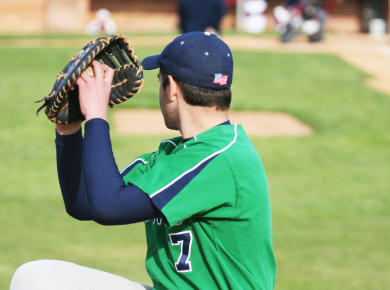- Disease & Symptom Information
- Pediatrics
- Primary Care
- Service Line
What to Know About Pediatric Sports Injuries

No matter the season, playing sports tends to be a major part of childhood. With more than 60 million kids taking part in organized sports in the U.S. every year, according to Safe Kids, there is a sport for every interest.
Of course, along with this high number of youth athletics come injuries. In fact, more than 1.35 million kids visit the emergency room for sports-related injuries each year, according to Safe Kids. The most common? Ankle sprains, muscle strains, bone/growth plate injuries and repetitive motion injuries.
“Kids ages 5-14 are more likely to have an bony injury at the growth plate, than a muscular injury,” said Emily Dixon, DO, a physician who specializes in sports medicine. “The most common is Osgood Schlatter, where the patellar tendon attaches to the tibia. Kids experience pain and swelling or a lump on the front of their knee. It’s usually associated with activities involving a lot of running such as soccer, basketball and track. I also see a lot of young lacrosse players with it.”
Dr. Dixon said she also sees kids with injuries to the growth plate on the heel bone, called Sever’s Disease.
“Both of these injuries are completely activity related,” she said. “These are overuse injuries. They’re not dangerous, but they can be quite painful.”
While injuries may be common, most children will change their activity levels on their own until they recover, according to a study on pediatric sports injuries.
“Kids will not get overuse injuries on their own,” Dr. Dixon said. “Overuse injuries happen when adults and coaches get involved.”
She said that coaches and parents need to pay attention to kids who complain about pain or who look injured.
“If a kid says something hurts when they’re running or something active, listen to them,” Dr. Dixon said. “If they’re limping or pulling back, you need to bring them in.”
Injuries can be a sign that kids’ bodies are doing too much so, when they start to limp or avoid using one of their limbs, they need to rest, put ice on the injury and take a pain reliever, such as ibuprofen, she said. They may also need to cut down on the number of activities they do, as injuries often happen to children who are overscheduled by, for example, playing overlapping seasons of sports.
“I love when kids play multiple sports, but they need time to relax and heal,” Dixon said. “Kids need time to just freely play and be active how they want to. If you have a kid whose elbow hurts and then they break their growth plate, they’re doing too much.”
Dr. Dixon says one injury concern comes from kids focusing on one sport too soon. They should not specialize until their growth plates are closed – ages 12-14 for girls and ages 15-17 for boys, she said.
“Just because they’re really talented at baseball when they’re 8 years old, they’re not necessarily going to be a major league pitcher,” she said. “If you blow your elbow at 14 and have to have Tommy John’s surgery repair, your chance of being a major league pitcher is extremely low.”
Dixon speaks from experience, as she wasn’t able to pursue a college soccer career after injuring both her anterior cruciate ligaments when she was younger.
“I used to run half marathons, and I can’t anymore,” she said. “I tell patients a lot, ‘I’ve been there, I’ve had these injuries, I understand.’”
Dixon encourages parents to let kids just play and use all their muscles.
“Let your kids be kids – play on a jungle gym, play in the woods, ride on their bike,” she said.
As for sports, still let your kids participate. Just don’t overschedule them.
“I one hundred percent believe the benefit of sports so far outweighs the risk of injury,” Dr. Dixon said. “Let them try things, and let them fail. It will teach them a good life lesson.”
If your child needs treatment for a sports-related injury, make an appointment at TriHealth Orthopedic & Spine Institute, where you can also ask for more guidance on how to keep your child injury-free.
*All providers quoted in this article were employed by TriHealth at the time of publication
Related Articles
- Infectious Disease
- Pediatrics
- Service Line
- Health & Wellbeing
- Mental Health
- Pediatrics
- Service Line